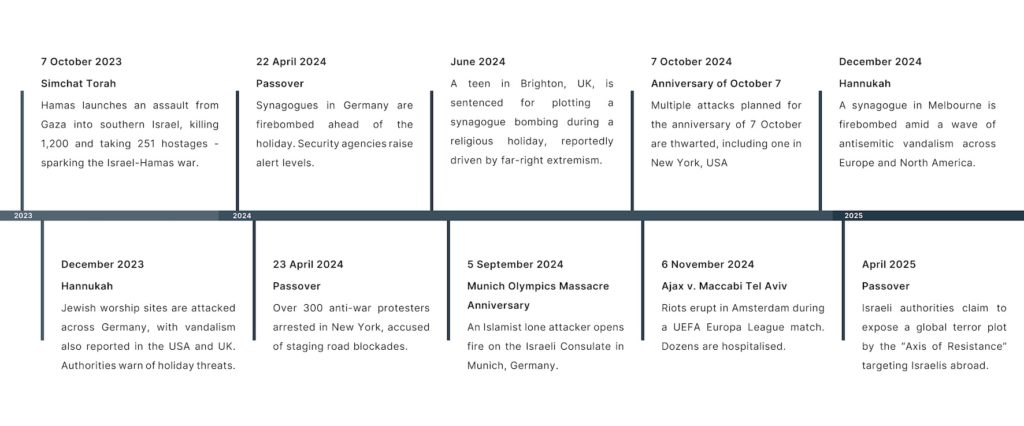Alert+
Increased Risks Expected During Passover Celebrations
Intelligence cut-off: 13:00 GMT 07 April 2025
Passover, or Pesach, is one of the major holidays of the Jewish religious calendar, as it marks the Exodus of the Israelites from Egypt described in the Torah. In 2025, the holiday begins on the evening of 12 April and ends on 20 April.
Passover occurs against a backdrop of sharply rising global antisemitic incidents, which have escalated significantly following Hamas’s 7 October 2023 attack in southern Israel and Israel’s subsequent invasion of Gaza. The holiday also falls during renewed hostilities in Gaza, which reignited after the collapse of the ceasefire between Israel and Hamas in March 2025.
Over the past 18 months, there have been numerous cases of attacks targeting Jewish people and places of worship, as well as any entities associated with Israel. Many of these incidents have occurred on dates of particular significance to Jewish and Israeli communities. They have included religious observances, such as the firebombing of a Melbourne synagogue during Hanukkah; historical commemorations, such as the lone wolf attack on the Israeli consulate in Munich on the 2024 anniversary of the 1972 Olympics massacre; and events linked to Israeli entities, such as the Amsterdam riots on the day of a Europa League football match involving an Israeli team.
On 1 April, Israeli authorities stated that they had thwarted a joint terror attack plot involving Hezbollah, Hamas, and Iran. The alleged plan was to target Israelis abroad or the wider Jewish community in response to the resumption of hostilities in Gaza.
Timeline of Global Security Incidents Since October 7 2023

INTELLIGENCE ANALYSIS
Lone Actor and Organised Group Attacks Possible Around Passover
There is a realistic possibility of terror attacks on or near Passover. Lone wolves, particularly espousing radical Islamist or far-right ideologies, are likely to target Jewish places of worship or community centres. Places of interest associated with Jewish history, such as Holocaust memorials and museums, are also likely targets due to their high traffic and visibility. Attackers may target Israeli consulates and embassies, although the risk here is lower due to their enhanced security presence. Attacks on Jewish interests may not be confined solely to Israel and major Western cities, as evidenced by previous attacks or plots targeting Jewish communities in South America and East Asia.
In addition, organised terror groups may seek to stage attacks during or near the holiday. Groups like Hamas and Palestinian Islamic Jihad likely retain the ability to stage attacks in Israel and the West Bank, particularly targeting security personnel and Israeli civilians. Moreover, the Islamic State (IS) and its network of global affiliates have intensified efforts to stage external attacks over the past two years and may seek to capitalise on the high visibility of the religious holiday to stage a high-impact and symbolic attack.
There is also an elevated threat of civil unrest around Passover, particularly in cities with a history of Gaza-related protests. While most demonstrations are likely to be peaceful, isolated incidents of vandalism or direct action against businesses, diplomatic sites, or religious buildings linked to either side of the conflict remain possible. In 2024, Jewish anti-war protestors staged a demonstration in New York, demanding that the US cease military aid to Israel.
Travel Risk Advice: Safety Guidelines for High-Risk Events and Holidays
- Closely monitor local news reports and government alerts.
- Avoid all large gatherings, including, if possible, large celebrations in public spaces.
- Consider alternative transport routes. Avoid public transport.
- If attending an event, identify exit routes and safe points. Identify if and which authorities are present in the area.
- Maintain regular communication with management or other safe contacts. Establish clear communication protocols ahead of travel.
- Monitor alerts and updates on Solace Secure.
- Adhere to all instructions issued by authorities.
- Have local emergency numbers and other key contacts available and saved on your personal devices.
- When attending events, always carry personal identification documents with you.

